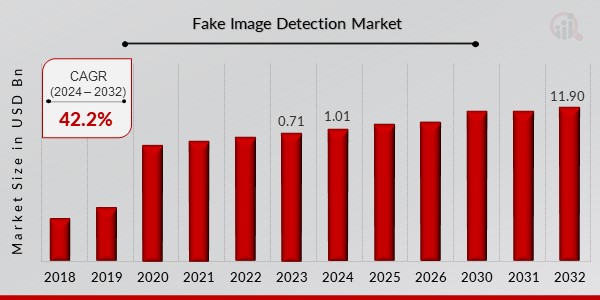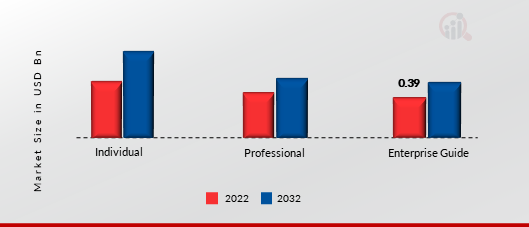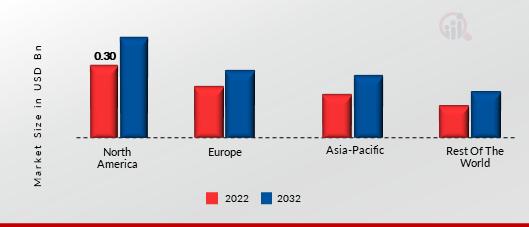Fake Image Detection Market Overview
The Fake Image Detection Market size is projected to grow from USD 1.01 billion in 2024 to USD 11.90 billion by 2032, exhibiting a compound annual growth rate (CAGR) of 42.2% during the forecast period (2024 - 2032). Additionally, the market size for Fake Image Detection was valued at USD 0.71 billion in 2023.
The rise of misinformation and the need to protect brand reputation are the key market drivers that enhance market growth.
Figure1: Fake Image Detection Market, 2018 - 2032 (USD Billion)

Source: Secondary Research, Primary Research, MRFR Database and Analyst Review
Fake Image Detection Market Trends
The growing need to protect brand reputation is driving the market growth
Market CAGR for Fake Image Detection is propelled by the imperative need for brand reputation protection in the digital landscape. In today's digital age, where consumers heavily lean on visual stimuli to guide their buying choices, safeguarding brand authenticity stands as a critical concern for enterprises spanning various sectors. The surge in counterfeit imagery, whether crafted with ill intent or shared unknowingly, presents substantial hazards to brand equity, consumer confidence, and, ultimately, financial prosperity. Consequently, corporations are channeling resources into cutting-edge counterfeit image identification solutions to shield their brands against the pernicious impacts of disinformation and deceit.
Preserving brand integrity emerges as a cornerstone for market expansion, underscoring the indispensable value of genuineness in fostering consumer reliance. The rampant dissemination of counterfeit visuals across social networking sites, news channels, and online marketplaces exposes brands to perilous reputation pitfalls should their logos, merchandise, or promotional materials fall victim to distortion or tampering. Furthermore, the swift contagion of digital media magnifies the repercussions of falsified imagery, capable of swiftly reaching multitudes of viewers and inflicting lasting damage on brand sentiment.
The surge in deceptive information propels the demand for solutions adept at identifying counterfeit imagery. Amidst the widespread dissemination of manipulated visuals throughout online domains, enterprises confront escalated perils to their standing and trustworthiness. Consumers, discerning of deceptive narratives, actively pursue unadulterated content, prompting firms to allocate resources towards technologies capable of discerning authenticity from fabrication. As the appetite for dependable visual material escalates, so does the imperative for robust counterfeit image detection mechanisms, propelling market expansion. Enterprises grasp that countering deceptive narratives not only fortifies their brand integrity but also bolsters consumer reliance, culminating in heightened sales and competitive edge. Thus, driving the Fake Image Detection market revenue.
Fake Image Detection Market Segment Insights
Fake Image Detection Offering Insights
The Fake Image Detection Market segmentation, based on offering, includes solutions and services. In 2023, the solutions segment dominated the market, accounting for 70% of market revenue (0.50 Billion). The sales of solutions will increase due to the rising demand for comprehensive and automated Fake Image Detection systems, providing businesses with efficient and scalable solutions to combat misinformation effectively.
Fake Image Detection Target User Insights
The Fake Image Detection Market segmentation, based on target user, includes individual, professional, and enterprise guide. In 2023, the enterprise guide category generated the most income (55%). Sales of Enterprise Guide will rise as larger organizations prioritize comprehensive Fake Image Detection strategies, seeking tailored solutions, extensive support, and integration capabilities to safeguard their brand reputation effectively.
Figure 2: Fake Image Detection Market, by Target User, 2023 & 2032 (USD Billion)

Source: Secondary Research, Primary Research, MRFR Database and Analyst Review
Fake Image Detection Technology Insights
The Fake Image Detection Market segmentation, based on technology, includes ML and DL, and image forensics. In 2023, the ML and DL category generated the most income. Sales of ML and DL technologies will surge owing to their ability to offer advanced and automated Fake Image Detection capabilities, providing high accuracy and adaptability to evolving manipulation techniques.
Fake Image Detection Deployment Mode Insights
The Fake Image Detection Market segmentation, based on deployment mode, includes on-premises and cloud. In 2023, the cloud category generated the most income. Sales of cloud-based solutions will escalate due to their flexibility, scalability, and accessibility, enabling businesses to seamlessly integrate Fake Image Detection capabilities into their digital infrastructure while minimizing upfront costs and maintenance efforts.
Fake Image Detection Organization Size Insights
The Fake Image Detection Market segmentation, based on organization size, includes large enterprises and small and medium enterprises. In 2023, the large enterprises category generated the most income (58%). Sales to large enterprises will soar as they prioritize brand protection and invest in robust Fake Image Detection solutions to mitigate reputational risks, ensuring the integrity of their visual content across digital platforms.
Fake Image Detection Application Insights
The Fake Image Detection Market segmentation, based on application, includes social media and content moderation, digital forensics, fraud detection, healthcare and medical imaging, and recruitment. In 2023, the social media and content moderation category generated the most income. Sales in social media and content moderation will surge due to the escalating spread of misinformation online, prompting platforms to invest in Fake Image Detection technologies to maintain user trust and platform integrity.
Fake Image Detection Vertical Insights
The Fake Image Detection Market segmentation, based on vertical, includes government, BFSI, healthcare, telecom, real estate, media & entertainment, and other verticals. In 2023, the media & entertainment category generated the most income. Sales in Media & Entertainment will escalate as the industry grapples with the proliferation of fake images, driving the adoption of detection solutions to preserve authenticity and credibility in visual content.
Fake Image Detection Regional Insights
By region, the study provides the market insights into North America, Europe, Asia-Pacific and the Rest of the World. North America is poised to dominate the Fake Image Detection market due to several factors. It boasts a mature technological landscape, with a high adoption rate of digital platforms vulnerable to misinformation. Moreover, stringent regulations and increasing awareness of misinformation's impact on society propel the demand for detection solutions. Additionally, North American companies often lead in innovation, driving advancements in Fake Image Detection technology. These factors position North America at the forefront of market dominance in this rapidly evolving landscape.
Further, the major countries studied in the market report are the US, Canada, Germany, France, the UK, Italy, Spain, China, Japan, India, Australia, South Korea, and Brazil.
Figure 2: FAKE IMAGE DETECTION MARKET SHARE BY REGION 2023 (USD Billion)

Source: Secondary Research, Primary Research, MRFR Database and Analyst Review
Europe Fake Image Detection market accounts for the second-largest market share due to technological advancements and regulatory pressure. Further, the German Fake Image Detection market held the largest market share, and the UK Fake Image Detection market was the fastest growing market in the European region.
The Asia-Pacific Fake Image Detection Market is expected to grow at the fastest CAGR from 2024 to 2032. This is due to social media influence and digital transformation. Moreover, China’s Fake Image Detection market held the largest market share, and the Indian Fake Image Detection market was the fastest growing market in the Asia-Pacific region.
Fake Image Detection Key Market Players & Competitive Insights
Leading market players in the Fake Image Detection industry are pivotal in driving innovation and competitiveness. They continuously invest in research and development to enhance detection accuracy and scalability, addressing the evolving needs of the global Fake Image Detection industry. These players closely monitor market developments, including emerging manipulation techniques and regulatory changes, to maintain a competitive edge. Strategic partnerships and acquisitions further bolster their capabilities, enabling them to expand their product portfolios and market reach. As the demand for Fake Image Detection solutions continues to grow, these key players play a crucial role in shaping the future landscape of the industry, driving advancements and setting standards through their leadership and expertise.
In the dynamic landscape of the Fake Image Detection industry, competition among key players intensifies as they vie for market share and technological superiority. These players continuously strive to innovate and differentiate their offerings to meet the diverse needs of the global Fake Image Detection industry. Market dynamics, including technological advancements and shifting consumer preferences, shape the competitive landscape, driving players to adapt and evolve their strategies. Moreover, the increasing prevalence of fake images across digital platforms underscores the importance of robust detection solutions, further fueling competition among industry participants. As a result, key players focus on enhancing their product capabilities, expanding their geographic presence, and forging strategic alliances to gain a competitive edge in the Fake Image Detection market. In this highly competitive environment, agility, innovation, and customer-centricity are critical for sustaining growth and leadership in the evolving global Fake Image Detection industry.
Major players in the Fake Image Detection market, including iProov, Q-integrity, iDenfy, Truepic, Reality Defender, Microsoft Corporation, Gradiant, Primeau Forensics, Sentinel AI, Sensity AI, BioID, Kairos and others, are attempting to increase market demand by investing in research and development operations.
iProov, a global leader in liveness detection and Genuine Presence Assurance, provides multi-dimensional biometric face authentication solutions trusted by governments, banks, and enterprises worldwide. Their technology ensures online individuals are verified accurately, in real-time, and with high security against fraud. iProov's solutions offer high completion rates, an intuitive user experience, and inclusivity across age and ethnicity, making them accessible on various devices and platforms. With globally proven scalability and resilience, iProov maintains excellent relationships with customers and partners, cementing its position as a trusted provider in the biometric authentication industry.
Reality Defender offers a cutting-edge deepfake detection platform that enables enterprises to identify fraudulent users and content, including audio, visual, and documents. With real-time risk scoring, reporting, alerts, and forensic review capabilities, our API and app provide comprehensive protection against cyber threats. Our team, with over 20 years of experience at Google, Goldman Sachs, and the Intelligence Community, merges expertise in data science and cybersecurity to deliver robust solutions. Our platform serves various customer use cases, including onboarding KYC for anti-fraud measures, content moderation across social media, e-commerce, and other platforms, as well as disinformation detection for news, defense, and government sectors, ensuring the integrity and security of digital environments.
Key Companies in the Fake Image Detection Market Include
Fake Image Detection Industry Developments
May 2023: Microsoft unveils a novel AI tool designed for moderating text and images. Over two years in development, Microsoft addressed the growing concern of harmful content within online communities. A spokesperson emphasized the inadequacy of existing systems in contextual comprehension and multilingual capabilities. The new AI models exhibit an advanced understanding of content and cultural nuances, operating seamlessly across languages. Moreover, they offer transparent explanations, enabling users to grasp the rationale behind flagged or removed content.
January 2022: iProov secures $70 million in funding for its facial verification technology. Biometrics, particularly facial recognition, have experienced a surge in usage, serving as a pivotal tool in digital identity verification amidst escalating fraud and cyber threats. Additionally, amid pandemic-induced social distancing measures, facial recognition technology has facilitated remote authentication processes.
Fake Image Detection Market Segmentation
Fake Image Detection Offering Outlook
Fake Image Detection Target User Outlook
- Individual
- Professional
- Enterprise Guide
Fake Image Detection Technology Outlook
- ML and DL
- Image Forensics
Fake Image Detection Deployment Mode Outlook
Fake Image Detection Organization Size Outlook
- Large Enterprises
- Small and Medium Enterprises
Fake Image Detection Application Outlook
- Social Media and Content Moderation
- Digital Forensics
- Fraud Detection
- Healthcare and Medical Imaging
- Recruitment
Fake Image Detection Regional Outlook
-
North America
-
Europe
-
Germany
-
France
-
UK
-
Italy
-
Spain
-
Rest of Europe
-
Asia-Pacific
-
China
-
Japan
-
India
-
Australia
-
South Korea
-
Rest of Asia-Pacific
-
Rest of the World
-
Middle East
-
Africa
-
Latin America
| Report Attribute/Metric |
Details |
| Market Size 2023 |
USD 0.71 Billion |
| Market Size 2024 |
USD 1.01 Billion |
| Market Size 2032 |
USD 11.90 Billion |
| Compound Annual Growth Rate (CAGR) |
42.2% (2024-2032) |
| Base Year |
2023 |
| Market Forecast Period |
2024-2032 |
| Historical Data |
2019-2022 |
| Market Forecast Units |
Value (USD Billion) |
| Report Coverage |
Revenue Forecast, Market Competitive Landscape, Growth Factors, and Trends |
| Segments Covered |
Offering, Target User, Technology, Deployment Mode, Organization Size, Application, Vertical, and Region |
| Geographies Covered |
North America, Europe, Asia Pacific, and the Rest of the World |
| Countries Covered |
The US, Canada, Germany, France, UK, Italy, Spain, China, Japan, India, Australia, South Korea, and Brazil |
| Key Companies Profiled |
iProov, Q-integrity, iDenfy, Truepic, Reality Defender, Microsoft Corporation, Gradiant, Primeau Forensics, Sentinel AI, Sensity AI, BioID, and Kairos |
| Key Market Opportunities |
· Industry Partnerships · Vertical Expansion · Global Market Penetration |
| Key Market Dynamics |
· Rise of Misinformation · Brand Protection · Social Media Influence · Cybersecurity Concerns |
Frequently Asked Questions (FAQ) :
The Fake Image Detection Market size was valued at USD 0.71 Billion in 2023.
The global market is projected to grow at a CAGR of 42.2% during the forecast period, 2024-2032.
North America had the largest share in the global market
The key players in the market are iProov, Q-integrity, iDenfy, Truepic, Reality Defender, Microsoft Corporation, Gradiant, Primeau Forensics, Sentinel AI, Sensity AI, BioID, and Kairos
The social media and content moderation dominated the market in 2023.
The media & entertainment had the largest share in the global market.



























